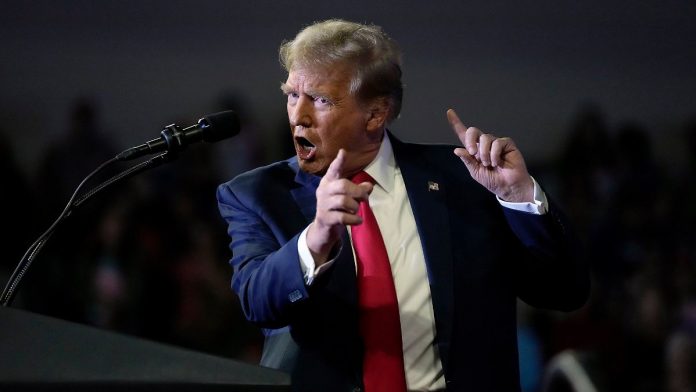Donald Trump is facing a court ruling that could significantly empty his coffers. His real estate empire is at stake. The public prosecutor is also demanding a hefty fine.
The verdict that Judge Arthur Engoron in New York will hand down is likely to cost Donald Trump a lot of money. The prosecution is demanding a fine of 370 million dollars and that the ex-president lose control of his real estate empire in the state. The judge has already announced that Trump will be sentenced to a hefty fine. The only question is how high it will be. The verdict could be announced shortly, according to the New York Times.
The accusation in the trial, which the judge has already confirmed: Trump and his sons Donald Jr. and Eric inflated the value of the Trump Organization for years in order to obtain cheaper loans and insurance. Trump's real estate holdings are part of the corporate network.
The former president denied the accusation in his typical manner and claimed that his assets were actually much larger than he had told the banks. He assured the courtroom that the Trump Organization currently has a whopping $400 million in liquid assets.
The boasting cost Trump dearly in another trial: A jury awarded US author E. Jean Carroll an unusually high amount of compensation of 83.8 million dollars. She had sued the former president for defamation. An idea from the prosecutor may have been instrumental in helping her make her decision: on the last day of the trial, she showed the jury a recording in which Trump boasted about the 400 million in cash.
Trump sues reporter
Judge Engoron's ruling could significantly reduce Trump's cash reserves. However, it is completely unclear how large they really are. This is partly because the Trump Organization is a private company that is not required to submit detailed financial reports.
A distinction must also be made between cash and net assets. The assets of Trump's family company consist primarily of investments in illiquid real estate projects and, if necessary, must first be made liquid through sales – a process that is usually time-consuming.
Even the tax documents that Trump made public do not allow any precise conclusions to be drawn about Trump's financial situation. The lion's share of his income is income as a real estate owner or investor. However, it is not clear how much of this income was actually paid out to him. To put it into context: The US magazine “Daily Beast” asked three tax experts about Trump's financial situation based on the publicly available tax documents. One result: When he left the White House in 2021, he was estimated to have had immediate access to a sum of between 30 and 100 million dollars.
That's still a significant sum, but Trump has a habit of exaggerating his actual wealth. He's always been enthusiastic about claiming he's “really rich.” During his presidential campaign and his time in the White House, Trump steadfastly refused to release his tax records, ending a practice that candidates and presidents have followed for decades.
“My net worth fluctuates,” The Week magazine quoted Trump as saying in a 2007 affidavit after he sued a New York Times reporter for allegedly underestimating Trump's net worth. “It rises and falls with the markets and attitudes toward them and feelings – even my own feelings.” The lawsuit was dismissed.
“More than 10 billion”
What is certain is that the figures for Trump's wealth vary. In the 2012 book “Time to Get Tough,” Trump claimed that his wealth was $7 billion. The US magazine “Forbes” estimated it at $3.1 billion at the time. At the start of his presidential campaign, Trump himself said he was only worth around $9 billion, but a few weeks later he was “worth more than $10 billion.” Forbes' estimate: $3.7 billion.
Forbes put Trump's fortune at $2.6 billion for 2023. The financial news agency Bloomberg puts it at $3.1 billion. That's a lot of money. But Trump's expensive lawyers in several lawsuits and criminal proceedings and potentially further high damages and fines are causing his cash reserves to dwindle. And if a number of his properties are actually placed under receivership and liquidated – as demanded by the New York prosecutor's office – the associated fines alone could drive Trump into bankruptcy in the near future – if they continue to apply after appeals and a very possible second Trump presidency.


